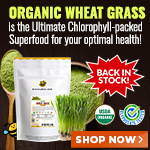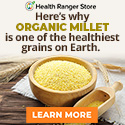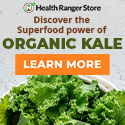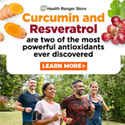
Vegetables May Reduce Hardening of Arteries (press release)
Friday, August 18, 2006 by: NewsTarget
Tags: health news, Natural News, nutrition
- Newly released JFK files reveal Pentagon's role in creating Lyme disease and covid in the same lab
- The hidden dangers in your kitchen: How cooking methods impact diabetes, cancer and aging
- DEADLY DECEPTION: How COVID vaccines increased mortality rates and why authorities hid the truth
- CDC finally halts $11 billion COVID funding scam as health officials admit the ‘pandemic’ was a fraud
- Arkansas embraces medical freedom with landmark ivermectin law
- Home gardening for preppers: A beginner's guide to growing your own food
- Lab leak confirmed? Boris Johnson's stunning reversal on COVID origins sparks global debate
- GAIN-OF-FUNCTION CAT-BIRD-FLU now on the rise as nearly a dozen cats in Colorado "test positive" for Bird Flu due to contaminated cat food
- Unraveling the paradox: Why intelligent individuals fall prey to everyday blunders
- Cartels shift tactics: Kidnappings and organ trafficking surge as border crossings plummet under Trump policies
- Why you should think twice before buying mainstream toothpaste formulas
- Was JFK's assassination orchestrated by a CIA double agent? New evidence points to James Angleton as the “architect”
- “Rent-a-womb” scandal: How China is exploiting U.S. birthright citizenship for long-term espionage
- Key nodes of Federal Government censorship
- Trump's greatest betrayal so far: Accelerating Middle East wars, silencing dissent, and serving Zionist masters
- ATTENTION PRESIDENT TRUMP: Please WITHDRAW your nomination of Dr. Susan Monarez for CDC Director as she is a VAX FANATIC and TOXIC JAB ZEALOT
- Record honeybee deaths devastate U.S. agriculture, pesticides under scrutiny
- Speaker Johnson warns Congress may defund or disband rogue courts targeting Trump
- Newly released JFK files reveal Pentagon's role in creating Lyme disease and covid in the same lab
- Elon Musk: Aliens could be here on Earth RIGHT NOW
- Festive flavors: The sweet history, nutritional profile and health benefits of pecan pie
- Trump reverses course on Gaza plan, says “nobody is expelling Palestinians”
- Reclaim your health: How midlife exercise reverses years of inactivity
- Big Pharma's $8 Billion bribery scheme exposed: how doctors are pushed to prescribe junk science, not heal
- Boys are back in town: Trump’s patriotic alpha crew takes the wheel while toxic females ride in the backseat
- EPA advisor admits the agency is funneling billions to climate groups ahead of Trump’s return to White House
- Space war brewing? Russia threatens to destroy Starlink satellites
- Survival 101: Effective EMF blocking techniques
- A lack of integrity in Academia: Harvard professor found GUILTY of fraudulent research to promote CRT theory
- Mike Adams Sermon 66: God will DESTROY ISRAEL for its wickedness
- 5 Simple steps to boost your brainpower: How to strengthen executive function in a distracted world
- Rep. Nancy Mace introduces bill to ban biological males from female facilities on federal property
- Sugarcane extract superior to cholesterol-lowering drugs?
- WHO focusing more on policing speech about public health and implementing global surveillance systems
- Pilots report mysterious lights 'moving at extreme speeds' across Oregon skies
- Dr. Mike Yeadon releases 15-minute testimony - WATCH - about genocidal intent of COVID “vaccines”
- EPA advisor admits the agency is funneling billions to climate groups ahead of Trump’s return to White House
- The Health Ranger releases “Vaccine Zombie” song and music video, using AI-animated zombies for the music video
- California's social media censorship law struck down: A victory for free speech or a threat to online safety?
- Dr. Mike Yeadon releases 15-minute testimony - WATCH - about genocidal intent of COVID “vaccines”
- The pandemic as a tool for INDOCTRINATION: Understanding “The Indoctrinated Brain” by Dr. Michael Nehls
- Florida takes a stand: DeSantis proposes permanent ban on mRNA vaccine mandates
- Mike Adams releases country western hit single: Goin’ Back in Time is Comin’ Home
- Mike Adams releases music poetry sensation: A Child of God
- “Why we influenced the 2020 elections”: Facebook files reveal the coordinated effort to bury the Hunter Biden laptop story
- RFK Jr. clears key hurdle: Sen. Susan Collins backs controversial HHS nominee, signaling a new era for health policy
- Unpacking the Lies That We’ve Been Fed – new song and music video released by Mike Adams, the Health Ranger
- Mike Adams releases new song and music video: Nothing More Disgusting Than a Globalist
- Newly released JFK files reveal Pentagon's role in creating Lyme disease and covid in the same lab
- Congratulations to the FULLY UNVACCINATED as you resisted the COVID-19 PROPAGANDA MACHINE fueled by over $100 BILLION
- Michigan sheriff announces criminal investigation into 2020 election crimes, Dominion Voting Systems
- Israeli soldiers accused of even more torture and abuse in the West Bank
- Migrants are taking advantage of recent hurricanes to scam residents and loot their homes
- House Intelligence Committee calls for the ARREST and PROSECUTION of Dr. Anthony Fauci
- Red Cross issues warning to stop blood plasma donations from vaccinated people
- Scientists confirm: GENIUS brain function can be spontaneously unleashed in humans without any apparent cause
- EPA advisor admits the agency is funneling billions to climate groups ahead of Trump’s return to White House
- HYSSOP: What research reveals about the health benefits of this ancient holy herb
- Two containers with completed ballots fall out of truck in Florida
- Fully vaccinated about to see “tsunami” of illness and death, warns virologist
- Global leaders unite to clamp down on “misinformation” with UN-backed Cascais Declaration
- BREAKING: 2025 NDAA authorizes mandatory military draft of WOMEN across America… as Pentagon pursues global NUCLEAR war with both Russia and China at the same time
- Michael Yon warns of a ZIONIST TAKEOVER in Trump’s second administration
- BOMBSHELL: DNA testing kits are a SCAM to develop ethnic-specific bioweapons
- Ozempic and Wegovy weight loss drugs are injectable LIZARD VENOM PEPTIDES that may unleash a devastating wave of organ failure… side effects align with symptoms of SNAKE BITES
- Israeli soldiers accused of even more torture and abuse in the West Bank
- These 13 countries just signed an agreement to engineer a global FAMINE by destroying food supply
- NASA admits that climate change occurs because of changes in Earth’s solar orbit, and NOT because of SUVs and fossil fuels
- RFK Jr. clears key hurdle: Sen. Susan Collins backs controversial HHS nominee, signaling a new era for health policy
- Sermon 30: How Jesus reveals Caesar’s FAKE CURRENCY and FALSE AUTHORITY
- Coriander seeds: Ancient medicine backed by modern science
- Arizona officials claim Maricopa County needs 10-13 days to tabulate results of the election
“While everyone knows that eating more vegetables is supposed to be good for you, no one had shown before that it can actually inhibit the development of atherosclerosis,” said Michael Adams, D.V.M., lead researcher. “This suggests how a diet high in vegetables may help prevent heart attacks and strokes.”
The study used specially bred mice that rapidly develop atherosclerosis, the formation on blood vessel walls of fatty plaques that eventually protrude into the vessel’s opening and can reduce blood flow. The mice have elevated low-density lipoprotein ( LDL), or “bad” cholesterol, which is also a risk factor for atherosclerosis in humans.
Half of the mice in the study were fed a vegetable-free diet and half got 30 percent of their calories from a mixture of freeze-dried broccoli, green beans, corn, peas and carrots. These five vegetables are among the top-10 vegetables in the United States based on frequency of consumption.
After 16 weeks, the researchers measured two forms of cholesterol to estimate the extent of atherosclerosis. In mice that were fed the vegetable diet, researchers found that plaques in the vessel were 38 percent smaller than those in the mice fed vegetable-free diets. There were also modest improvements in body weight and cholesterol levels in the blood.
The estimates of atherosclerosis extent involved measuring free and ester cholesterol, two forms that accumulate in plaques as they develop. The rate of this accumulation has been found to be highly predictive of the actual amount of plaque present in the vessels.
Adams said it is not clear exactly how the high-vegetable diet influenced the development of plaques in the artery walls.
“Although the pathways involved remain uncertain, the results indicate that a diet rich in green and yellow vegetables inhibits the development of hardening of the arteries and may reduce the risk of heart disease,” said Adams.
He said that a 37 percent reduction in a certain marker of inflammation in mice suggests that vegetable consumption may inhibit inflammatory activity.
“It is well known that atherosclerosis progression is intimately linked with inflammation in the arteries,” Adams said. “Our results, combined with other studies, support the idea that increased vegetable consumption inhibits atherosclerosis progression through antioxidant and anti-inflammatory pathways.”
Numerous studies in humans have shown that a high-vegetable diet is associated with a reduced risk of cardiovascular disease, as well as with reductions in blood pressure and increases in “good” cholesterol. This is believed to be the first study to address the effect of increased vegetable consumption on the development or progression of atherosclerosis.
Despite compelling evidence supporting the health benefits of increased vegetable consumption, intake remains low, Adams said. The mean consumption is 3.2 servings per days, with about 40 percent coming from starchy vegetables such as potatoes.
The research was funded by the General Mills Company, which supplied the freeze-dried vegetables.
Co-researchers were Deborah Golden, B.S., Haiying Chen, Ph.D., Thomas Register, Ph.D., all with Wake Forest, and Eric T. Gugger, Ph.D., with the Bell Institute of Health and Nutrition, General Mills Company. The cholesterol analysis was performed by the Core Lipoprotein Laboratory of the Department of Pathology/Lipid Sciences at Wake Forest.
Health news at FETCH.news
Get independent news alerts on natural cures, food lab tests, cannabis medicine, science, robotics, drones, privacy and more.
Take Action: Support Natural News by linking to this article from your website
Permalink to this article:
Embed article link: (copy HTML code below):
Reprinting this article:
Non-commercial use OK, cite NaturalNews.com with clickable link.
Follow Natural News on Facebook, Twitter, Google Plus, and Pinterest
Science News & Studies
Medicine News and Information
Food News & Studies
Health News & Studies
Herbs News & Information
Pollution News & Studies
Cancer News & Studies
Climate News & Studies
Survival News & Information
Gear News & Information
News covering technology, stocks, hackers, and more



"Big Tech and mainstream media are constantly trying to silence the independent voices that dare to bring you the truth about toxic food ingredients, dangerous medications and the failed, fraudulent science of the profit-driven medical establishment.
Email is one of the best ways to make sure you stay informed, without the censorship of the tech giants (Google, Apple, Facebook, Twitter, YouTube, etc.). Stay informed and you'll even likely learn information that may help save your own life."
–The Health Ranger, Mike Adams











